Channing Tatum Fighting Interview
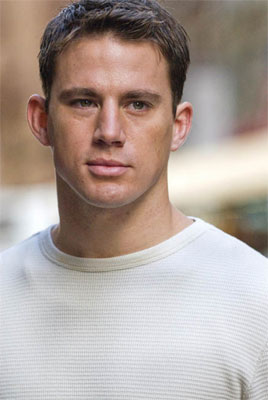
Channing is on the Rise
Channing Tatum, Fighting Interview by Paul FischerChanning Tatum is one actor who has seen his career skyrocket in a short period of time. Born on April 26, 1980, in a small town called Cullman, outside of Birmingham, Alabama, growing up, he was full of energy and somewhat troublesome, so his parents decided to enroll him in different sports such as track and field, baseball, soccer, and football to keep him out of trouble. In the ninth grade he was sent to military school. It was there that he discovered his passion for football and his hopes became centered on earning an athletic college scholarship. Channing Tatum's goal was finally met, and in his senior year in high school, he was recruited and earned a full athletic college scholarship to a school in West Virginia.
Channing Tatum is also skilled in Kung Fu and in Gor-Chor Kung Fu, a form of martial arts, in which he has earned belts in both. Channing Tatum later left college and, in the meantime, worked as a construction worker and mortgage broker and salesman. He has modeled for Abercrombie & Fitch, Nautica, Gap, Aeropostale, Emporio Armani, and has been featured in television commercials for American Eagle, Pepsi, and some very popular mountain dew commercials.
Channing Tatum was first be seen on the big screen in Coach Carter (2005), in which he plays a high school basketball player. He was also in the very popular TV series "CSI: Miami" (2002) where he played the role of Bob Davenport and will be seen in this summer's much anticipated G.I. Joe The Rise of Cobra, as well as Michael Mann's Public Enemies and the soon-to-be released romantic drama Dear John. In Fighting, Channing Tatum stars opposite Terrence Howard as a young counterfeiter who is introduced to the world of underground street fighting by a seasoned scam artist (Howard), who becomes his manager on the bare-knuckling brawling circuit. He spoke to Paul Fischer.
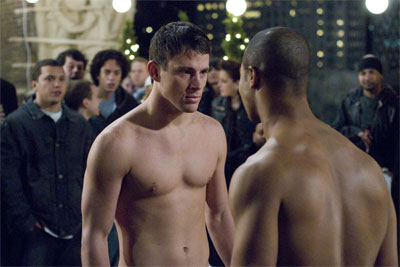 PAUL FISCHER: You and director Ditor Montiel are locked at the hip. Are you dating?
PAUL FISCHER: You and director Ditor Montiel are locked at the hip. Are you dating?CHANNING TATUM: Yeah, man. He's sexy. What's wrong with that?
PAUL FISCHER: But you are doing a third movie with him?
CHANNING TATUM: Well, he's rewriting a script that's sort of a spy movie. We don't know if we're going to do it but he's exploring it. It's sort of just an interesting opportunity. Whoever would have thought that Dito would be doing some international spy type of film. I definitely never thought he'd be into it but then he had a crazy, cool take on it. We've al seen the Bournes and everything. This won't be a Bourne, I'll promise you that, because no one can do Bourne better than Bourne.
PAUL FISCHER: Were you concerned that Fighting wouldn't be all about physicality?
CHANNING TATUM: Yeah, because the funny thing was this was a basketball film. The most hilarious thing was I was like, "I don't want to do a basketball film." Way before Dito was even on it, I tried to think of the one director that I know would never do a basketball movie, because they were like, "Well, what director do you want?" I'm like, Dito, because I never wanted to do a basketball movie. Next thing I know, lo and behold, a month later he calls me up and he's like, "Hey, I know. I know it's a basketball movie but just come meet. Come meet, I've got a take on it." I come meet him and he tells me it's Midnight Cowboy. I'm like, "Okay, that's amazing. I would love to play Joe Buck in Midnight Cowboy, especially your version of Midnight Cowboy." Then, all of a sudden, I'm still like, "Wait a minute, we haven't taken basketball out of it. It's still a basketball movie, Dito. We can't get away from this." He's like, "I know, I know, just trust me. We'll get it out" or "We'll figure it out." He's like, "We're going to take basketball, like, I, I don't know. We'll get basketball out of it." I'm like we can't do that. Finally, throughout all the different versions of what we were doing and we had less than three weeks to get the movie going, I just suggested let's just make a fighting film, because the basketball just kept getting more and more violent, knowing Dito. More and more violent, I'm like right, let's just take the basketball out. Then Misher, our producer, was just like, "[Sighs] I don't know if I can do that. Let me work on it." Then a week later, they did it and it was awesome.
PAUL FISCHER: Did any of Parkour bleed into this?
CHANNING TATUM: A completely separate thing with a different producer and everything. I don't know what's going on with that. I know it's getting rewritten.
PAUL FISCHER: What was the toughest thing, the fighting?
CHANNING TATUM: I guess probably because Dito just does drama and now he's done commercial drama. I think they're two different things, commercial and then drama. We really wanted to make a commercial film with decent acting and good characters because I think people just think now, they think commercial film, oh great, the acting is not going to be that great anymore, just because they don't care. They just want to see a big huge blow up of a movie. That's really what we want to do. We had an opportunity to bring those characters to a commercial film and we got really excited about it.
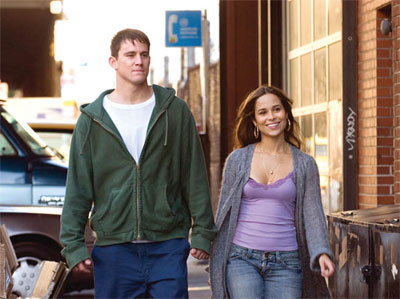 PAUL FISCHER: Did you have to find the balance of tough and nice?
PAUL FISCHER: Did you have to find the balance of tough and nice?CHANNING TATUM: No, I'm from the south. If I didn't open up the door for my mom or my sister, I got slapped in the back of the head. That got fixed real quick. I was not about to not do that.
PAUL FISCHER: So you brought that?
CHANNING TATUM: Yeah, yeah. Well, that's what Dito really wanted. I remember, they came to Dito and they told him he couldn't cuss in the movie. Dito was just like, "You want me to do an underground fighting movie on a PG-13? I can't do it. I'm going to go think about it tonight. If I can't wrap my head around it, then you have to find somebody else to do it." We were way down the line on the movie. They waited to tell us that. Then we talked about it. It was really his idea. He was like, "Look, no, Sean just chooses not to cuss. That's just his upbringing. He went to church. He doesn't cuss because he chooses to. Harvey's the same way. He's old fashioned."
PAUL FISCHER: You don't miss it.
CHANNING TATUM: Yeah, you don't notice it because the world is so sort of like that dangerous that you would suspect it and no one did it. I think it just goes to show you you can do anything if you do it right.
PAUL FISCHER: Did your dancing background help with the fighting scenes?
CHANNING TATUM: Yeah, I'd say that dancing has helped probably in everything, even in acting. Like you're comfortable with your body, you can relax. You don't get tight or tense or even choreography moving with people, staging, knowing your distance and stuff like that, that's probably the most - - the most dangerous thing is distance when you're doing those fake fights. You're swinging with all your might and they have to time you and you always make eye contact so you can't know exactly how far you're away because you're looking in someone's eyes. Then you swing and you just gotta know.
PAUL FISCHER: They got your nose?
CHANNING TATUM: Oh man, it was over here. I'm looking at Kevin Misher because there's no mirrors around where we were fighting. I'm like, "It's not good, huh?" Kevin was like, [SIGHS], he didn't even answer me. And Dito was like, "Heh, hoo, right." Then Yuri's ring man was there, thank God, and he goes and puts two spoons in ice and mashes my nose back in. It didn't swell that bad. My eyes got black a little bit but nothing we couldn't cover.
PAUL FISCHER: He's used to fixing that?
CHANNING TATUM: Yeah, he's just like right, blch. And was just mashing the swelling away. They just know how to fix 'em, man. I mean, it doesn't feel good but they know how to fix. That and quarters. Two cold quarters and just squeezing, squeezing your nose as hard as you can. Next time it happens, I'm like, "I got this, I got this."
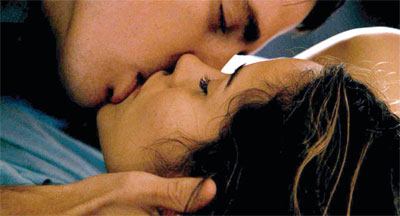 PAUL FISCHER: What was your workout?
PAUL FISCHER: What was your workout?CHANNING TATUM: Man, the greatest thing about my career is like I get to be really on and then really off. I go and I'm at home and I'm drinking beer and cheeseburgers and pizza and chocolate cake. Then when I'm on, I get really serious and it's all the way to the wall. The thing that's great is I have all day to work out. People that do 9 to 5s don't so I wake up and I run for an hour. And then I go and do my training, so when I was doing for Fighting, I'd go and I'd work out for two and a half hours, would fight, just straight up learning how to fight, learning how to be comfortable on the ground, standing up and taking punches and getting punches and blocking them. Then I'd go home and I'd run for another hour and a half or whatever it'd be. So running was a big part of my program but then eating well as well.
PAUL FISCHER: Now you've done a little indie film called GI Joe?
CHANNING TATUM: I haven't even heard of that. It's so little, it's barely on the map.
PAUL FISCHER: What were the challenges of playing the lead in a huge Hollywood movie, G.I. Joe?
CHANNING TATUM: It's not only daunting, that type of a film in general, for a seasoned actor or an actor that had done one of those films before, lower on the call sheet. I had no idea what I was doing. I had no clue. I was terrified of the movie. I had really no aspirations to go do a huge film like that really, not yet in my career. I didn't really feel ready for it. I kind of got thrown into it. In doing so, it really opened my mind to it's just acting. It's a different style of acting. It's more skipping along the surface and it is about the big explosions and stuff. You're not sitting there trying to do Shakespeare.
PAUL FISCHER: How do you take the work seriously when you can't take the film seriously?
CHANNING TATUM: You kind of find it. It's weird, and you laugh at it. It's the only way to really do it. I don't know anyone that wasn't laughing on the set all the time on G.I. Joe. Especially, Marlon Wayans is my partner in the movie and we laughed through the entire thing. I'm sitting there looking at a green screen like, "RIPCOOOORD! NOOOO!" Stuff like that and you're just like what am I doing? Or you're like, "You get the rockets, I'll get the nanomites. Wait a minute, what are nanomites?" I don't know what's going on but you're just having fun with it. You just pray. Pray, pray, pray that they get a good take in all the slew of things because you don't know what anything looks like. You don't know what you're reacting to and they're like, "Look right!" You're like [gasps]. Then they're like, "Look left!" And you don't know what's happening. You can only trust your director and that's it.
PAUL FISCHER: Is that the overacting everyone's talking about?
CHANNING TATUM: Exactly. I was afraid of overacting but that's what you can't be afraid of. You don't have to overact. I was the guy they'd have to pull it out of me. I'm like, "No, man, it just feels too bad. I can't do it." He's like, "Just trust me. Promise me you're going to do it and then I promise you I won't use the take if it's not right." Then I'm like okay. Ugh. I do it and it'd just be pulling teeth. You see it back now. I haven't seen the movie but I've seen ADR and stuff and it fits. You can't believe it. You thought you were just the worst actor on the planet.
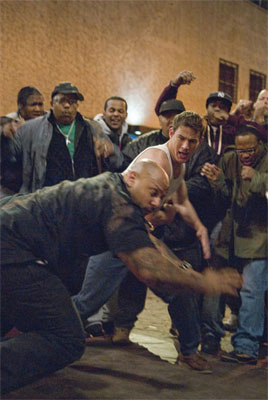 PAUL FISCHER: What was the line you thought you'd never say with a straight face?
PAUL FISCHER: What was the line you thought you'd never say with a straight face?CHANNING TATUM: Every one of the lines, every single one. What was the one that was, and I don't think they actually made it into the movie, was "Action figures sold separately." Something like that. They wanted me to put it in the film. Then there was like Marlon, Marlon actually, it wasn't me, Marlon had a line that was like, "And a kung fu grip." Because all the Joes had a kung fu grip. He had to say that about somebody that grabbed him. He was like, "Oh, he's got a kung fu grip." I was like, "That ain't ever gonna work. That's never, ever going to be in the movie" and it's in the movie and it works a little bit. All the fan boys will be like, "Yeah!" And anybody that doesn't know about the kung fu grip will be like, "Oh, whatever, it's just what he chose to say right then."
PAUL FISCHER: So it's self-referential?
CHANNING TATUM: Yes, it's very, sometimes. Just for the wink at the crowd.
PAUL FISCHER: Are you prepared for the fans?
CHANNING TATUM: It is going to be crazy. No. I don't think I could honestly say that I'm ready. If it does good. If it doesn't do good, then I'm totally ready. It's just going to be like it is now.
PAUL FISCHER: What else are you doing?
CHANNING TATUM: I don't really have anything coming up. There's a bunch of things that I'm now starting my producing career.
PAUL FISCHER: You have a company?
CHANNING TATUM: Yeah, my company which is just a couple buddies that are my writing partners and we're just starting to write now.
PAUL FISCHER: Name?
CHANNING TATUM: 33 and Out.
PAUL FISCHER: Why?
CHANNING TATUM: Just 33, out! It just means for us to work, to get to work because I love it. Look, I love acting but I think I'm going to really enjoy being on the other side one day. I like creating and almost not being in the spotlight. I like just to be the creative person that gets to write something that I think is interesting and see it come to life.
PAUL FISCHER: Which summer movies are you looking forward to seeing?
CHANNING TATUM: That's a good question. I don't know that many. What else is out there right now? Star Trek I'm interested in. I love Chris Pine. Obviously I love J.J., his films and stuff, and Chris Pine, I've always noticed him in every movie he's ever been in and I'm so happy for him that now this is his movie. He's going to rock it.
PAUL FISCHER: How do you mean the spy movie can't be Bourne?
CHANNING TATUM: It just can't be, you can't try to remake Bourne. Unless you have a crap load of money which I don't think that is even what a Bourne needs. Bourne's already Bourne and Bond have kind of done those things about as good as you can do them in that way. You can do something like it but you're just going to be chasing that and maybe getting close to it. I don't think you can beat Bourne at its own game.
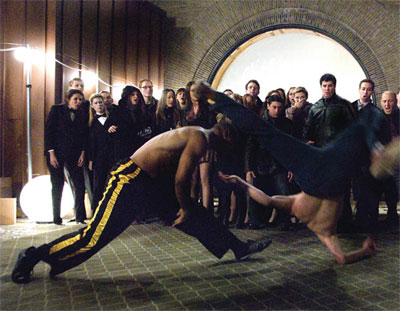 PAUL FISCHER: So what can you do?
PAUL FISCHER: So what can you do?CHANNING TATUM: I don't know, you're going to have to watch the movie because I know what he's going to do but I haven't read the script yet. I know his take on it and it's a Dito take and it's amazing.
PAUL FISCHER: Terrence says you're without ego.
CHANNING TATUM: Oh, that's cool, man.
PAUL FISCHER: Where does that come from and how long can it last?
CHANNING TATUM: I think you try your hardest to stay out of the spotlight and you don't listen to people. As much as, as sweet as you guys are, I don't read what is written because I think it can warp you, just like you just said. You have enough people telling you your something, a part of that is going to assimilate in your head. I don't read what other people write. I don't want to know. I just want to keep doing the things that I'm doing and hanging out with the people that know me from before I was in acting.
PAUL FISCHER: What's Dear John?
CHANNING TATUM: Romantic movie, Nicholas Sparks, I think everybody knows The Notebook. For the most part, it's not that far away. It's tear jerker, heartstrings. Hugely sentimental in more of a contemporary way. That piece, The Notebook was a very artistic film and it captured the time and I think this is a very contemporary relative time.
PAUL FISCHER: You're a soldier?
CHANNING TATUM: Yeah, a soldier that comes home on leave and falls in love with a girl. He has a peculiar sort of relationship with his dad. His dad has, unbeknownst to anyone in the family, Asperger's, a form of it, and he's a very reclusive person and nonsocial person, which has in turn made John a little bit antisocial.
PAUL FISCHER: Who plays the dad?
CHANNING TATUM: Richard Jenkins, such an oh my God amazing actor. He's the guy that you tap when you just need a brilliant actor to come in. You're just like, "Right, brilliant acting, go." And he does. He hits it every time on the mark.
PAUL FISCHER: He wrote this as a script before the book?
CHANNING TATUM: No, this was a book first. I didn't know he did that. That's cool.
PAUL FISCHER: That's the Miley Cyrus one.
CHANNING TATUM: Right, which I'm interested in seeing. He has such a formula that is so just like, I mean, it's like novocaine, man. It works. It just does. I got to meet him. He's actually a really interesting guy.
PAUL FISCHER: What are your plans for the summer?
CHANNING TATUM: I'm trying to figure out what movie. It's one of those - - I don't know. There's all these scripts out there that there's directors attached but no one can read the scripts because they're so top secret and you're like, "How do I want this movie? Look, I love you as a director and I would bend over backwards to do anything you're going to do, but I just want to know what it is." Like J.J. does which is really smart. He won't let anything out about anything which is kind of smart. They're doing it and they're doing it big so I don't know. It's one of those things where you go into the meetings and you're like okay. You've got to sign the confidential agreement and everything and then they sort of tell you what it is. You're like okay, all right, I understand what that character is. I think I would enjoy that in your version of that, so can I read a script? Then they're like, "Hmm, we'll call you." You're just like sh*t, because no one's making little movies anymore. It's just going to be big movies for a little while and maybe little small independents. These little tweeners like Fighting, they're just going to be less and less I think. I think so. Either way, I appreciate it, guys. Thank you, guys, thank you so much. Good to see you guys again.
Interview with Terrence Howard for Fighting - www.femail.com.au/terrence-howard-fighting-interview.htm
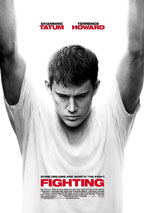
Fighting
Starring: Channing Tatum, Terrence Howard, Zulay Henao, Brian White, Luis GuzmánDirector: Dito Montiel
Genre: Action/Adventure
Runtime: 1 min 45 secs
In director Dito Montiels 2009 drama, FIGHTING, Channing Tatum (G.I. JOE: THE RISE OF COBRA) portrays Shawn, a young man from the South trying to make a living on the streets of New York City.... In director Dito Montiels 2009 drama, FIGHTING, Channing Tatum (G.I. JOE: THE RISE OF COBRA) portrays Shawn, a young man from the South trying to make a living on the streets of New York City.
When Shawn gets into an altercation while selling bootleg CDs and DVDs, a con man (Terrence Howard) who witnesses the brawl takes him under his wing and introduces Shawn to NYCs underground street-fighting circuit. In these bare-knuckle battles, Shawn has a chance to win significant money--and also the heart of the beautiful Zulay (Zulay Henao). A film that goes beyond its deceptively simple title and premise, FIGHTING is elevated by the keen eye of Montiel, who also co-wrote the script with Robert Munic, and the charismatic presence of Tatum, who previously had a minor role in the writer-directors cinematic debut, A GUIDE TO RECOGNIZING YOUR SAINTS.
Although the film goes through the standard up-by-the-bootstraps dramatic cycle, the performances of Tatum, Howard, and Henao make the story surprisingly compelling, and the fight sequences are exceptionally fierce, giving the movie considerable added zest. Though less high-profile than combat classics such as ROCKY and THE KARATE KID, FIGHTING fits well into the category of revered movies of the boxing/martial-arts subgenre.
MORE
- Viggo Mortensen The Road
- 24 Cast Reunion
- Aaron Eckhardt No Reservations
- Aaron Eckhart The Dark Knight
- Adam McKay Step Brothers Interview
- Alan Alda Diminished Capacity Interview
- Alan Alda Diminished Capacity Interview
- Alex Dimitriades
- Al Pacino Oceans 13
- Alan Rickman Snow Cake
- Alan Rickman Sweeney Todd



